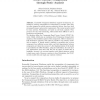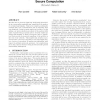14 search results - page 2 / 3 » Composition Does Not Imply Adaptive Security |
SP
2006
IEEE
13 years 11 months ago
2006
IEEE
Simulatable security is a security notion for multi-party protocols that implies strong composability features. The main definitional flavours of simulatable security are standa...
EUROCRYPT
2010
Springer
13 years 10 months ago
2010
Springer
Imagine many small devices send data to a single receiver, encrypted using the receiver’s public key. Assume an adversary that has the power to adaptively corrupt a subset of the...
SOCO
2008
Springer
13 years 5 months ago
2008
Springer
Abstract. Extensible Component Platforms support the discovery, installation, starting, uninstallation of components at runtime. Since they are often targeted at mobile resource-co...
STOC
2002
ACM
14 years 5 months ago
2002
ACM
d Abstract) Ran Canetti Yehuda Lindell Rafail Ostrovsky Amit Sahai? We show how to securely realize any multi-party functionality in a universally composable way, regardless of th...
JCS
2010
13 years 3 months ago
2010
Protocol authentication properties are generally trace-based, meaning that authentication holds for the protocol if authentication holds for individual traces (runs of the protoco...


